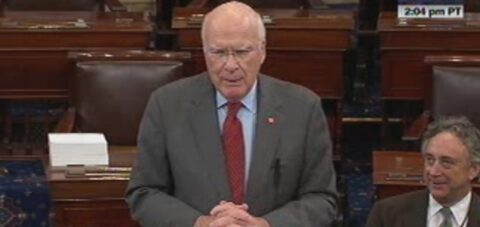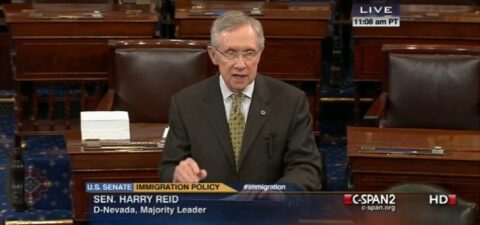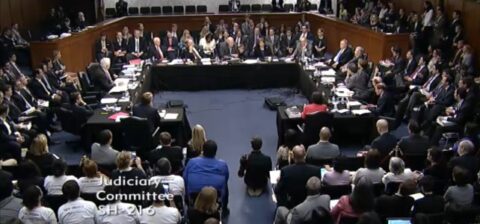Reform

Senate Overwhelmingly Approves Motion To Proceed To Immigration Bill
S. 744, the Gang of Eight’s immigration reform bill, cleared another significant hurdle today when the Senate approved a motion to proceed to the legislation. The motion to proceed passed overwhelmingly by a vote of 84-15. Read More

Procedural Path Of The Senate Immigration Bill
The Senate immigration reform debate has officially begun. Senate Majority Leader Harry Reid (D-NV) filed cloture on the motion to proceed Thursday on S. 744, the “Border Security, Economic Opportunity, and Immigration Modernization Act,” the first step to having the full Senate debate the measure after the Senate Judiciary Committee approved it a few weeks ago. Senators started to make their cases for and against the bill during floor speeches on Friday. On Tuesday, the Senate will vote to end debate on the motion to proceed to the immigration bill at 2:15 p.m. Tuesday and then vote to proceed at 4 p.m. Read More

New Report Reveals Scale of Deaths Along U.S.-Mexico Border
Nothing illustrates the high stakes of the immigration reform debate now taking place in the Senate quite as powerfully as the growing body count along the U.S.-Mexico border. Despite the U.S. government’s decades-long effort to stop unauthorized immigration through an “enforcement first” strategy, unauthorized migrants continue to cross the border—and scores die before completing the journey. In fact, the Tucson sector alone witnessed 2,238 migrant deaths between Fiscal Year (FY) 1990 and FY 2012. That is one of the central findings of a new report from the Binational Migration Institute at the University of Arizona, entitled A Continued Humanitarian Crisis at the Border. The report examines data from the Pima County Office of the Medical Examiner to shed light on trends in border fatalities over time, as well as the demographic characteristics of those who died. Read More

Three Ways Immigration Reform Would Make the Economy More Productive
By David Dyssegaard Kallick, Director of the Fiscal Policy Institute’s Immigration Research Initiative. A report just released by the Fiscal Policy Institute, Three Ways Immigration Reform Would Make the Economy More Productive shows that legalization of undocumented immigrants, done right, would do three things to increase economic productivity in the United States. Read More

How the Immigration Reform Bill Could Help Undocumented Farmworkers and Growers
Approximately 11 million undocumented immigrants could become eligible for legal status under S. 744, the immigration reform bill the Senate is considering, including millions of undocumented farmworkers. The importance of finding a way to create a legal workforce within the agriculture industry is critical, as undocumented farmworkers make up an estimated 53 percent of agriculture workers. Read More

Medicare’s Health and Well-Being Depends on Immigrants
Immigrants’ access to affordable health care is one of the most contested issues in the current immigration reform debate. Most advocates of comprehensive immigration reform point to the need to ensure that aspiring citizens have opportunities to access appropriate health care since such access will impact their ability to learn, to work, and to contribute to their communities. On the other end of the spectrum, anti-immigration groups tend to inaccurately emphasize that newly legalized immigrants would represent an excessive fiscal burden. This prediction is based on a misleading characterization of immigrants as “takers”—in other words, as disproportionate consumers of public resources. Several studies have shown that this is just not the case. In fact, non-citizens use public benefit programs at a lower rate than similar low-income native-born citizens. With regard to medical expenditures in particular, immigrants tend to use less health care than their U.S.-born counterparts. Read More

Will Immigration Reform Correct the Immigration System’s Gender Bias?
Within the current immigration system, many women confront systematic barriers when trying to gain legal status. This is one of the main conclusions drawn from a study conducted by social scientists Cecilia Menjivar and Olivia Salcido. Based on a 10-year-long research project on immigrant women in Arizona, the authors identify specific instances in which gender inequality is ingrained in the formulation, interpretation, and implementation of immigration laws. Read More

How Immigrant Entrepreneurs Fare in the New Immigration Bill
With the Senate Judiciary Committee’s vote last week to pass S.744 on to the Senate floor, a new proposal for spurring immigrant entrepreneurship and innovation will be before Congress. Title IV, Subtitle H of the bill creates the INVEST visa (Investing in New Venture, Entrepreneurial Startups, and Technologies) for immigrant entrepreneurs. This new visa program would allow immigrant entrepreneurs to come to the United States, start businesses, and create jobs in America. There would be two types of INVEST visas. A nonimmigrant INVEST visa would be renewable provided certain initial investment, annual revenue, and job creation criteria are met within an initial three-year period. The immigrant version of the INVEST visa would have basically the same criteria just at higher thresholds. The committee also adopted an amendment that permanently authorizes the EB-5 Regional Center Program, which has created tens of thousands of American jobs and attracted over $1 billion in investments since 2006. Read More

Experts from Left and Right Agree on Economic Power of Immigration Reform
In recent years, study after study has demonstrated a simple yet economically powerful truth about broad-based immigration reform: workers with legal status earn more than workers who are unauthorized—and these extra earnings generate more tax revenue, as well as more consumer spending, which creates more jobs. As a new report from the Center for American Progress (CAP) points out, this fact implies that states with appreciable unauthorized populations stand to gain economically from immigration reform that includes a legalization program for the unauthorized. Moreover, a new open letter to Congressional leaders released by the conservative American Action Forum illustrates that it is not only liberal advocacy groups like CAP which recognize the economic potential of immigration reform. Read More

What Does the Success of the Mark-Up Tell us About the Coming Full Senate Vote on Immigration?
One year ago, with the presidential race in full swing and proponents of self-deportation making the headlines, it would have been difficult to predict the extraordinary vote that took place Tuesday in the Senate Judiciary Committee. Ten Democrats and three Republicans voted to pass S. 744 out of committee and send a comprehensive immigration bill to the Senate floor. This could never have happened without the overwhelming support for immigration reform that the public has shown, particularly since the November 2012 election. Even with that support, however, there was no guarantee that the long, slow process of negotiating and drafting a bipartisan bill that could succeed in committee (and then the Senate floor) would ever come to fruition. And once a bill is introduced, getting it through committee requires a mix of political acumen to keep the bill alive. Read More
Make a contribution
Make a direct impact on the lives of immigrants.
